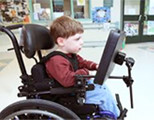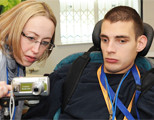Computer Access
For people with significant physical disabilities, simple tasks such as using a computer can be difficult. With computers being a significant part of everyday life, the Electronic Assistive Technology Service can provide solutions to allow people to access their computers.
What is Computer Access?
Computer access helps people who have significant physical disabilities to control their computer. People can be provided with devices which enable them to control their computer by switch, head movements, sip and puff or by eye gaze as well as other access methods.
Who is eligible for the service?
The Electronic Assistive Technology Service provides an assessment and equipment provision service for people who meet the criteria detailed in the service specification (D01/S/c), the main features of this are a significant physical disability which primarily affects upper limb movements and which results in the person being unable to use standard controls and an ability to use the equipment.
We are not able to supply equipment where a non-specialist solution exists or where the need is primarily educational ICT or employment access to work.
The service is open to children and adults, as well as those living in any setting (residential care, own home, nursing home) as long as the above criteria are met.
Most people who use environmental controls have a condition such as motor neuron disease, multiple sclerosis, spinal cord injury, cerebral palsy or acquired brain injury. However, this is not an exhaustive list.
What equipment can be provided
The computer access service can provide adapted equipment such as head mice, rollerball mice, adapted keyboards, sip and puff mice and many others. While we can provide training on the equipment we provide, we cannot provide general computer use training or training on any software which we have not provided.
We are not able to supply computers, only the adapted means to use them.
How can I be referred for an assessment?
Most referrals come from community Occupational Therapists (OT's), Nurses or Case Workers. Although you are able to self refer we would still require further advice from these professionals, so will need to contact them following your referral. Your Occupational Therapist, Nurse or Case Worker can use the 'For Professionals' section of this website to make a referral to the service.
If you do not have access to any of the professionals above, please contact the department for further advice.





